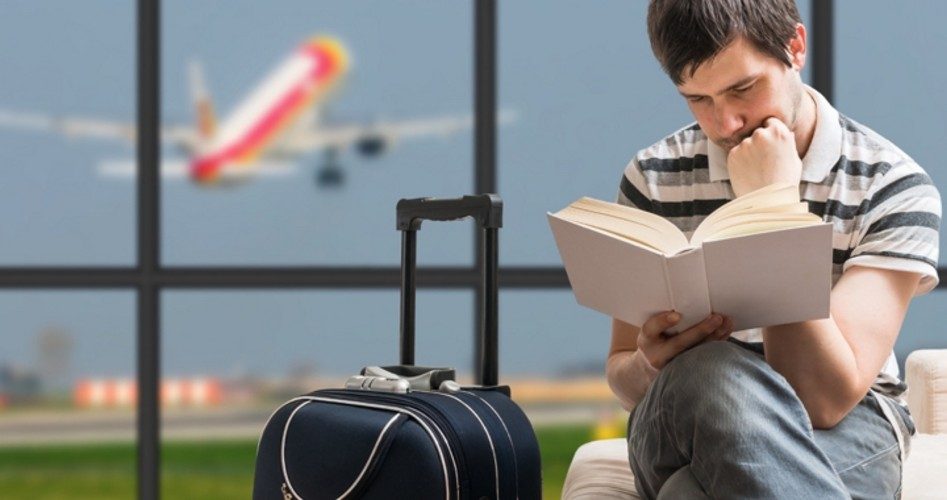
The ridiculously misnamed Transportation Security Administration (TSA) has begun forcing passengers traveling in two airports to remove their books and have them inspected before being allowed to board an airplane.
In an airport in Missouri and one in California, the TSA may, according to a June 1 story in The Week, force travelers “to take all reading material and food out of their carry-on luggage and place it in a separate bin. TSA screeners can ‘fan’ through travelers’ books to see if anything is hidden in the pages, but agency officials insist they will not pay attention to the content.
The story in The Week included a quote from a professor who experienced the book search personally.
“It’s always been a series of insults,” said Julie Sze, a University of California, Davis professor. “Books, magazines, food, those are like my three treasured things. It feels personal on a whole different level.”
Treasured things may be exactly what the TSA may be looking for. Ask yourself if you think that the TSA could be charged with clamping down on travelers carrying religious texts (the Quran, for example) or with so-called “anti-government” literature (The New American, for example).
This latest forced humiliation is just the beginning.
In May, Department of Homeland Security (DHS) Secretary John Kelly announced, “We’re going to raise the bar for aviation security much higher than it is now. It’s a real sophisticated threat.”
TSA’s own blog explains, regarding the need to rifle through passengers’ paper products:
“We’re always testing procedures to help stay ahead of our adversaries…. You might be wondering why we were interested in books,” the blog reads. “Well, our adversaries seem to know every trick in the book when it comes to concealing dangerous items, and books have been used in the past to conceal prohibited items. We weren’t judging your books by their covers, just making sure nothing dangerous was inside.”
Our adversaries? When it comes to threats to our safety and denials of our liberty, we have much more to fear from the plutocrats on the Potomac than from any alleged terrorist on the Tigris.
Anyone who has passed through TSA security checkpoints is an eyewitness to the excesses exercised by this agency. The threat of terrorism after September 11, 2001 was used as a pretext to give them an inch of intrusive authority and the never-ending prosecution of the “War on Terror” has been used by them as an excuse to take a mile of liberty from the people of the United States.
It’s not, however, that such TSA abuses are unconscionable — they are — but they are unconstitutional, as well.
The Fourth Amendment to the U.S. Constitution guarantees that the right of the people “to be secure in their persons, houses, papers, and effects, against unreasonable searches and seizures, shall not be violated, and no Warrants shall issue, but upon probable cause, supported by Oath or affirmation, and particularly describing the place to be searched, and the persons or things to be seized.”
The Fourth Amendment was included in the Bill of Rights as a response to the experience of many of the Founding Generation with Writs of Assistance.
Simply defined, the Writs of Assistance were general warrants issued by the Crown that permitted agents of the British government to enter buildings owned by the colonists to search and seize any material they believed were somehow related to smuggling.
These writs gave government officials the authority to enter into any privately owned building (including homes) to make their searches. They needed no properly executed warrant — that is to say, a warrant specifically describing the place to be searched and the things to be seized.
In light of the direct relationship between 18th century Writs of Assistance and 21st century TSA searches and seizures at airport security checkpoints, a couple of statements by John Adams would be instructive.
First, from a letter to his wife Abigail written on July 3, 1776:
“When I look back to the Year 1761, and recollect the Argument concerning Writs of Assistance, in the Superiour [sic] Court, which I have hitherto considered as the Commencement of the Controversy, between Great Britain and America, and run through the whole Period from that Time to this, and recollect the series of political Events, the Chain of Causes and Effects, I am surprized [sic] at the Suddenness, as well as Greatness of this Revolution.”
Next, a letter written in 1817 to his former student, William Tudor:
“Every Man of an immense crouded [sic] Audience appeared to me to go away, as I did, ready to take Arms against Writs of Assistance. Then and there was the first scene of the first Act of opposition to the Arbitrary claims of Great Britain. Then and there the Child Independence was born. In fifteen years i.e. in 1776. he grew up to Manhood, & declared himself free.”
Secretary Kelly said that all the TSA’s invasive procedures are “designed to work it out with the least inconvenience to the traveler.”
The process genuinely designed to be the least inconvenience to the traveler would be to allow the market to secure the skies. If Airline A wants to give pat downs to every traveler and Airline B uses an expertly engineered process of patrolling who is allowed on their planes, a way that prevents most passengers from suffering the inhumanity of TSA-style searches and seizures, is there any question which airline will be more profitable?
Photo: Thinkstock



